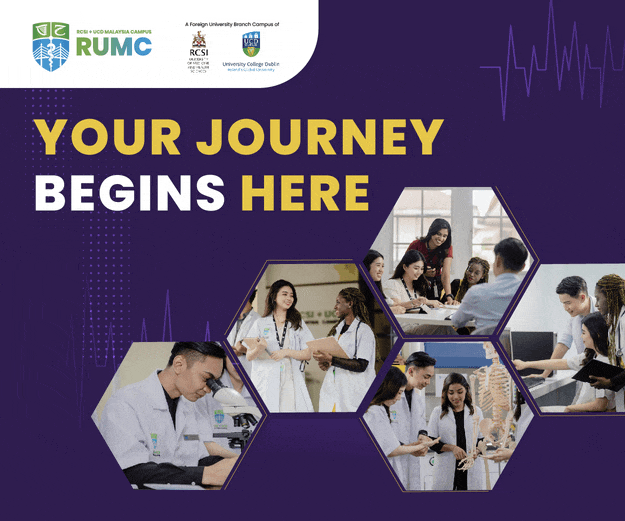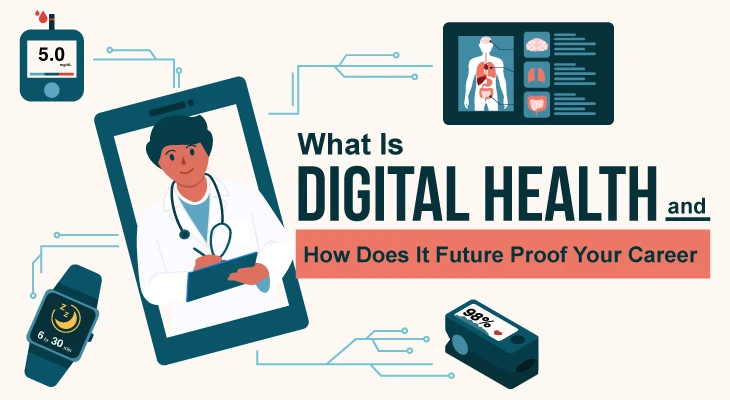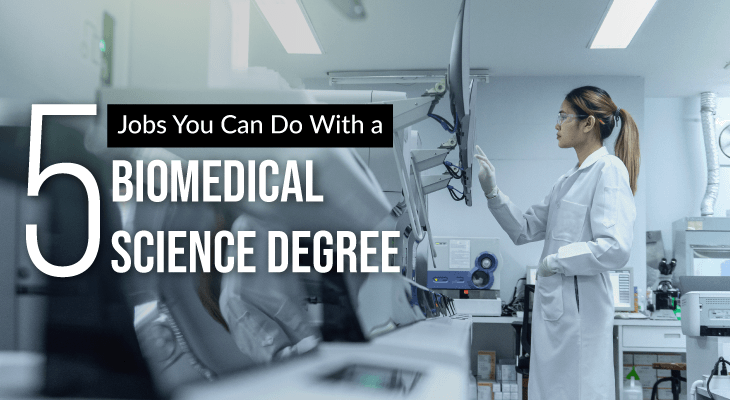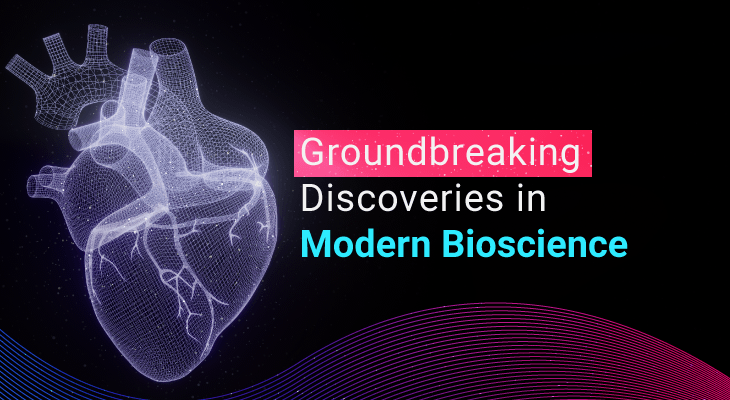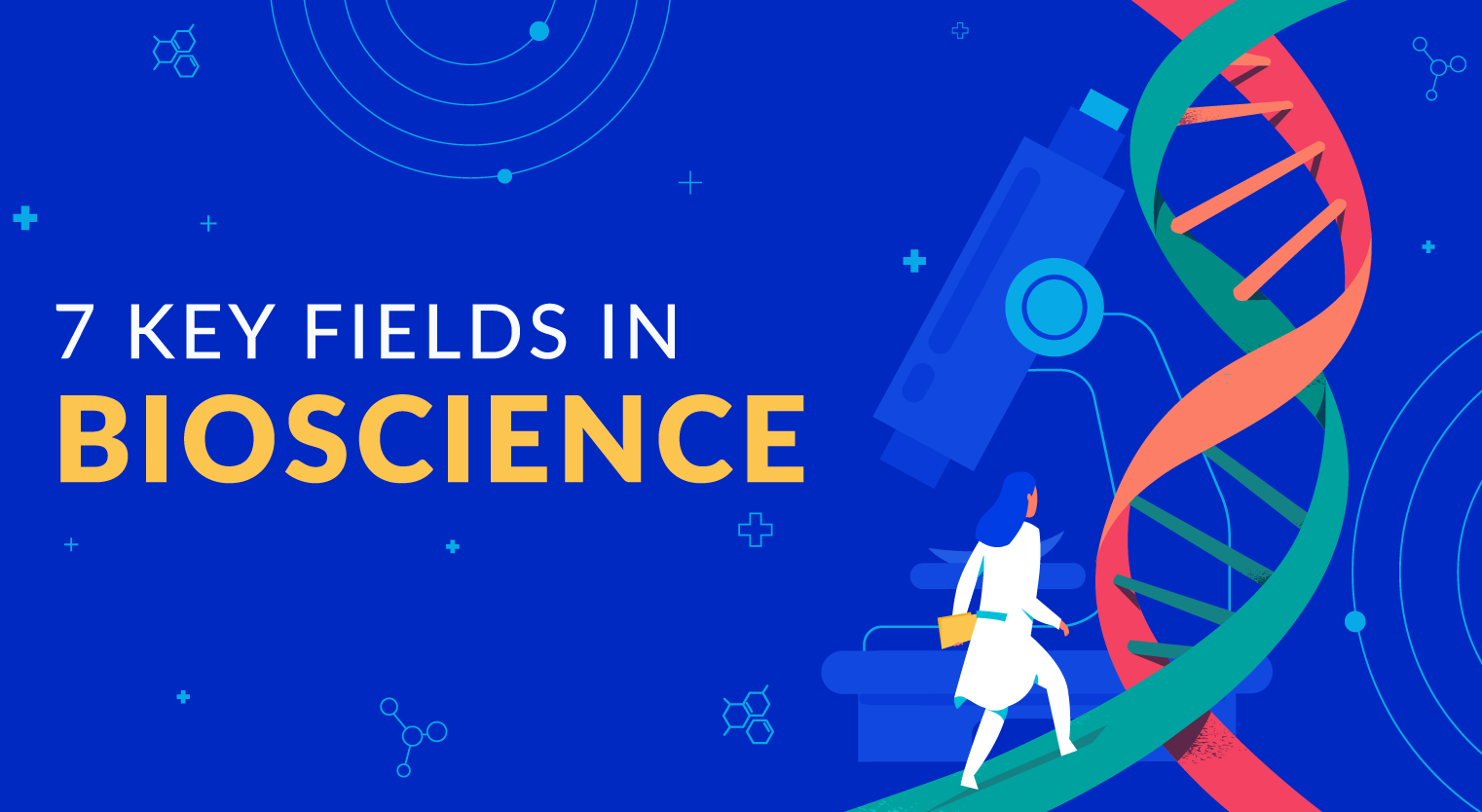The Future of Healthcare Is Digital. Here’s Where a Medical Informatics Degree Can Take You.
The future of healthcare is here — and it’s powered by data, AI and medical informatics.
Published 31 Jul 2025
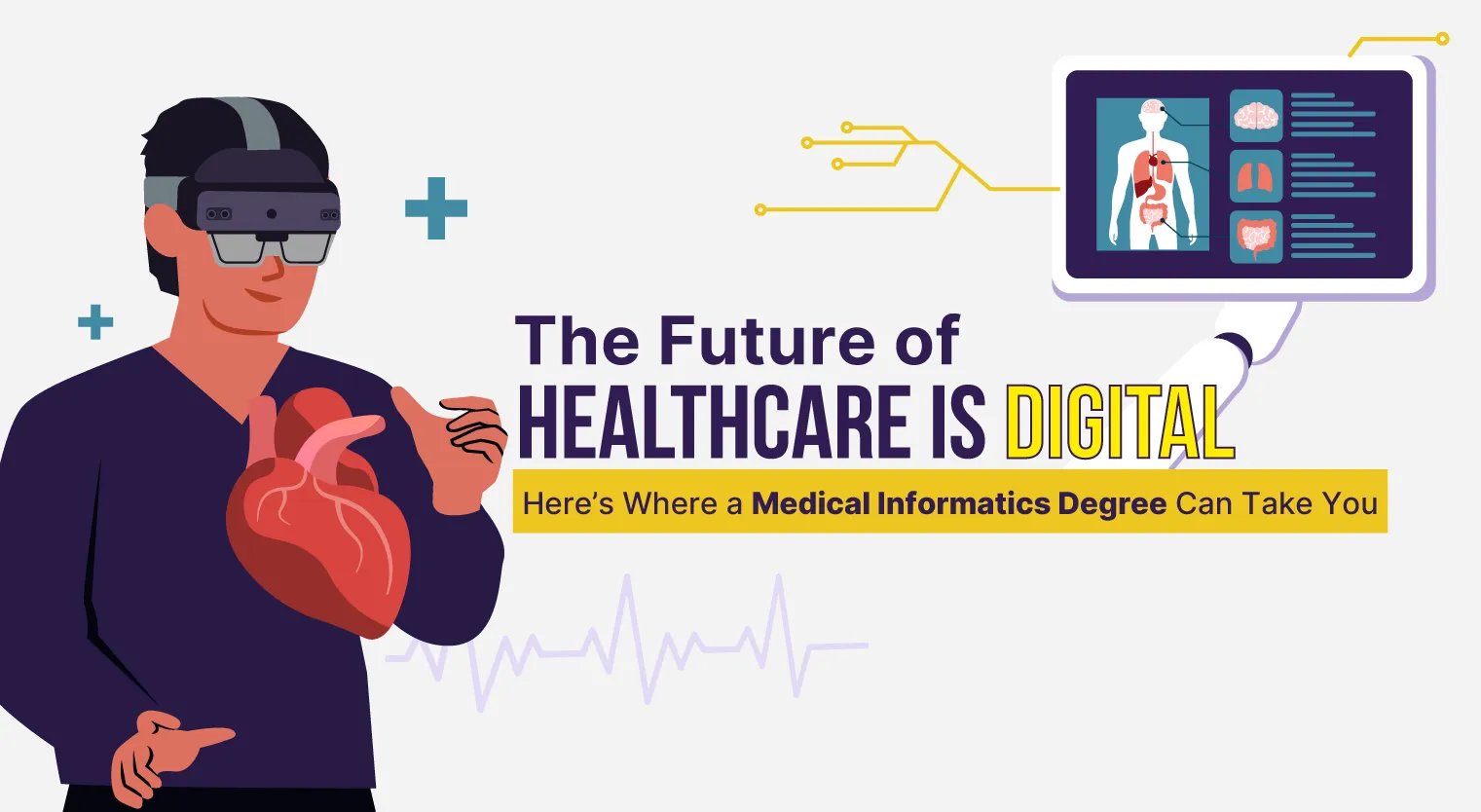
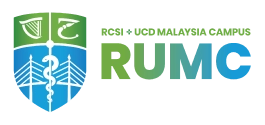
When we think of healthcare, we often imagine doctors, nurses and hospitals.
But what if we told you that the next big thing in healthcare isn’t a new drug, but technology itself and how it will transform the entire healthcare system?
Welcome to the world of medical informatics, where AI is helping to diagnose patients faster, telemedicine is bringing medical specialists to remote villages, and health data is being used to predict outbreaks before they even happen.
But what exactly is medical informatics? What is its role in healthcare? And what kind of careers can this degree lead to? We break it all down for you in this article.
What is medical informatics?
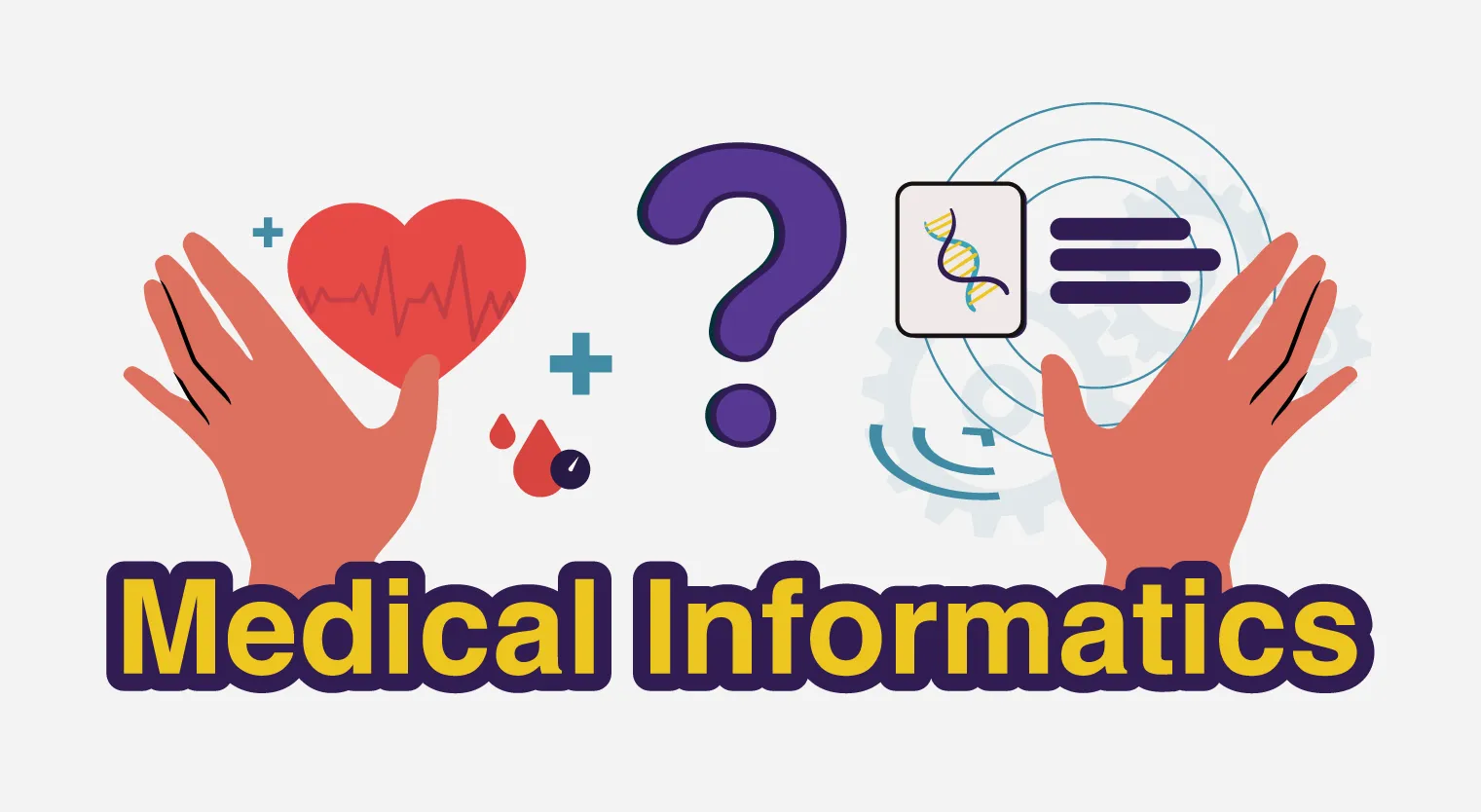
In simple terms, medical informatics is where medicine meets technology.
It’s an interdisciplinary field that combines medicine, computer science and data science to improve patient care, solve complex medical challenges, and help healthcare professionals work more efficiently.
Medical informatics bridges the gap between clinical expertise and cutting-edge technology, allowing healthcare systems to make smarter, faster, and more accurate decisions.
Did you Know:
RUMC’s BSc in Medical Informatics is the first programme of its kind in Malaysia, designed for those passionate about integrating healthcare and information technology. Learn more about it here.
How is medical informatics used in real life?
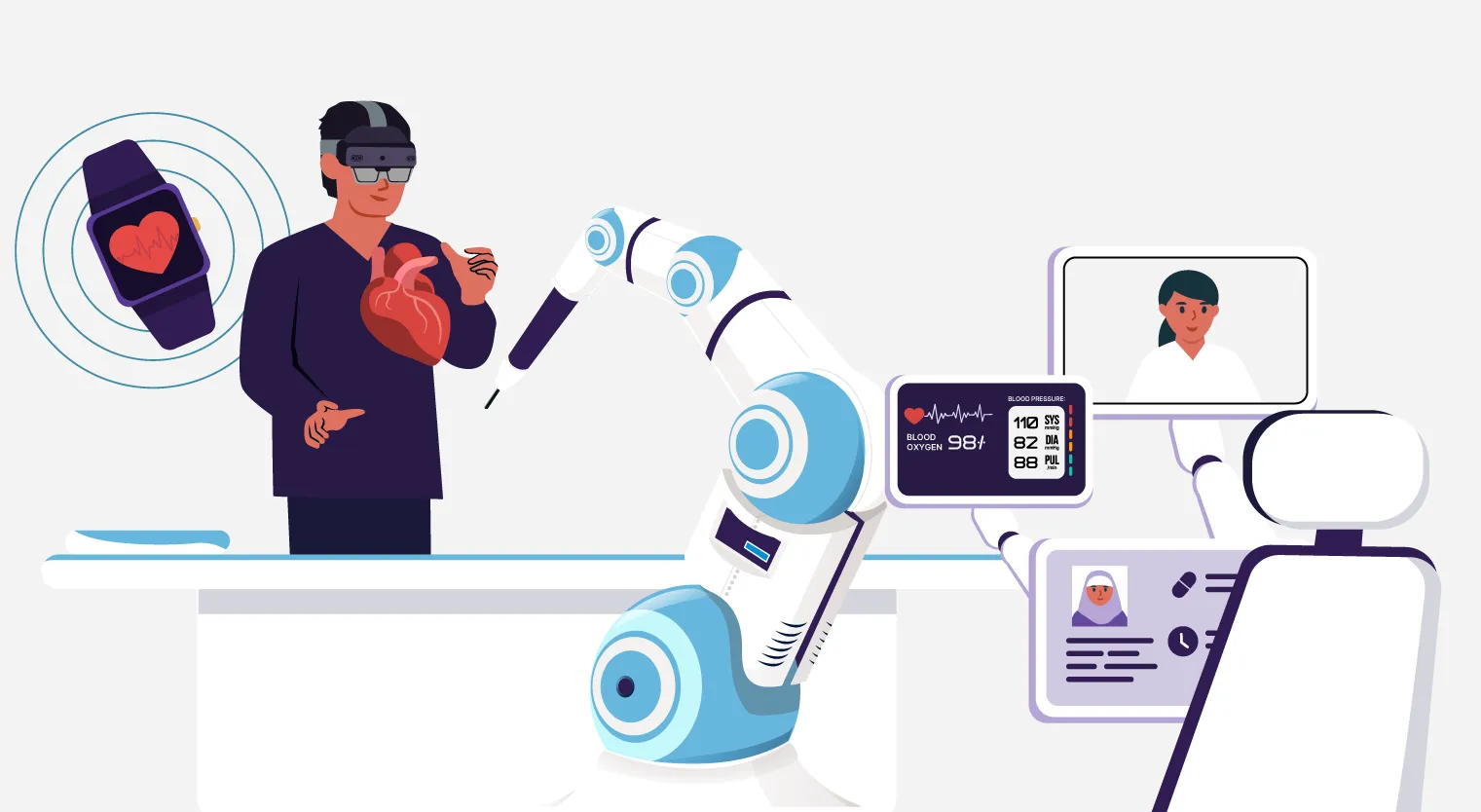
The applications of medical informatics are everywhere in today’s modern healthcare — even in places you might not expect.
Some real-world examples include:
- AI-powered diagnostics — algorithms can now detect tumours, strokes, or rare diseases years earlier and with greater accuracy than traditional scans
- Telemedicine and remote monitoring — virtual consultations complete with live vitals and high-definition visuals are revolutionising healthcare access
- Robot-assisted surgery — precision tools guided by robotics help surgeons perform complex procedures with extreme accuracy, resulting in faster recovery
- Health apps and wearables — devices like smartwatches track heart rate, sleep, oxygen levels, and more, alerting users (and doctors) to potential health risks
- Predictive analytics — by analysing trends in patient data, hospitals can optimise resources, reduce wait times, and even predict disease outbreaks
The future of medical informatics in healthcare
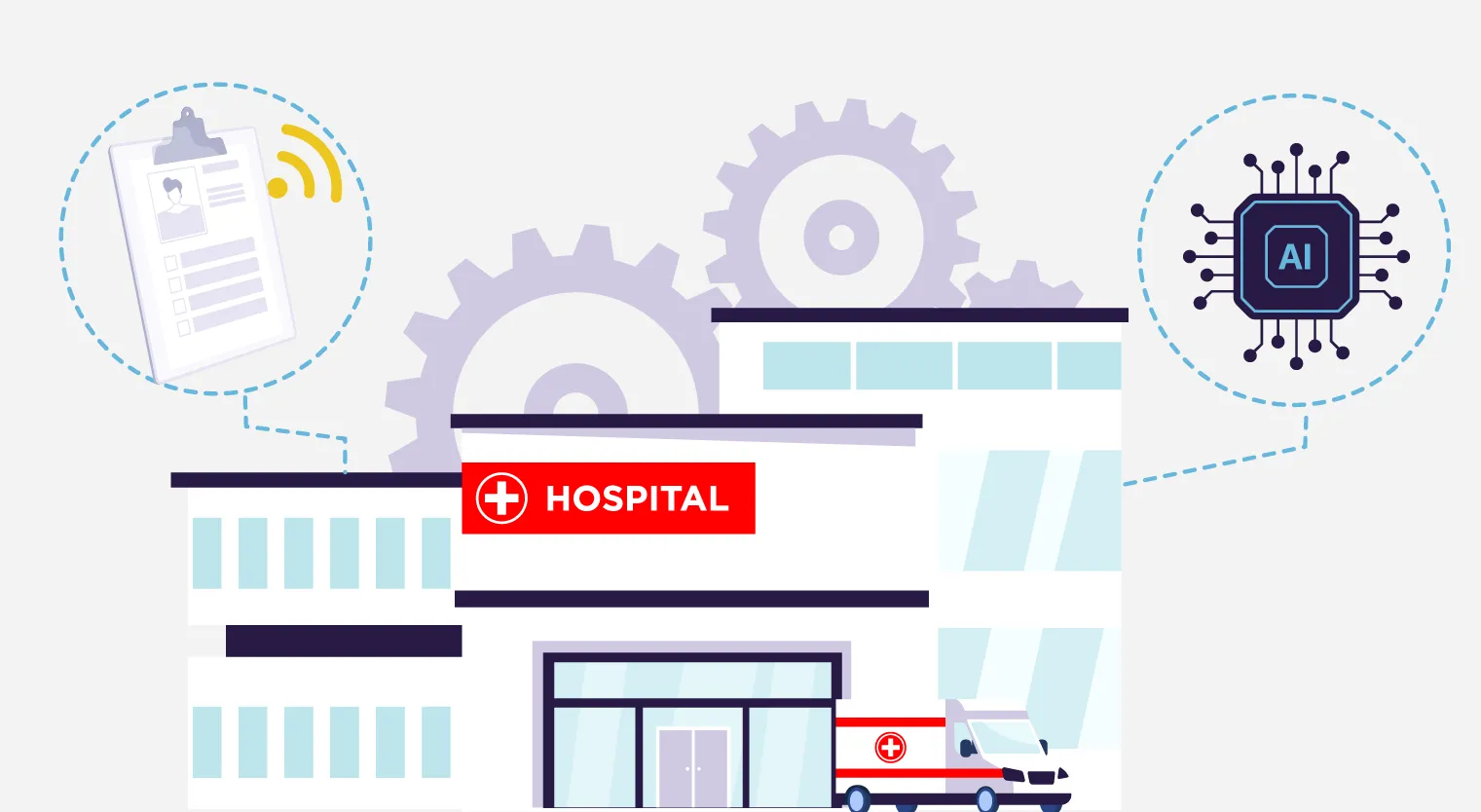
The healthcare industry is undergoing a rapid digital transformation. Hospitals are switching to electronic medical records, governments are investing in digital health, and AI is now helping doctors to diagnose illnesses. Even your smartwatch is collecting health data at every second.
All of this means that the world will need a new kind of professional — one who understands both medicine and technology.
Medical informatics professionals work behind the scenes to make healthcare smarter and more efficient. They design and manage the digital systems that support doctors, hospitals, and patients every step of the way — not just for today, but for the future.
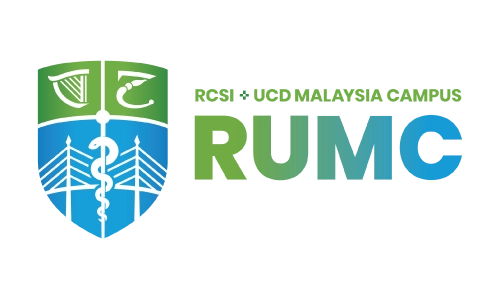
RCSI & UCD Malaysia Campus (RUMC)
Bachelor of Science in Medical Informatics
✓This programme will equip you with skills to revolutionise medical instrumentation and precision medicine, improving patient outcomes and system efficiency
Where can a degree in medical informatics take you?
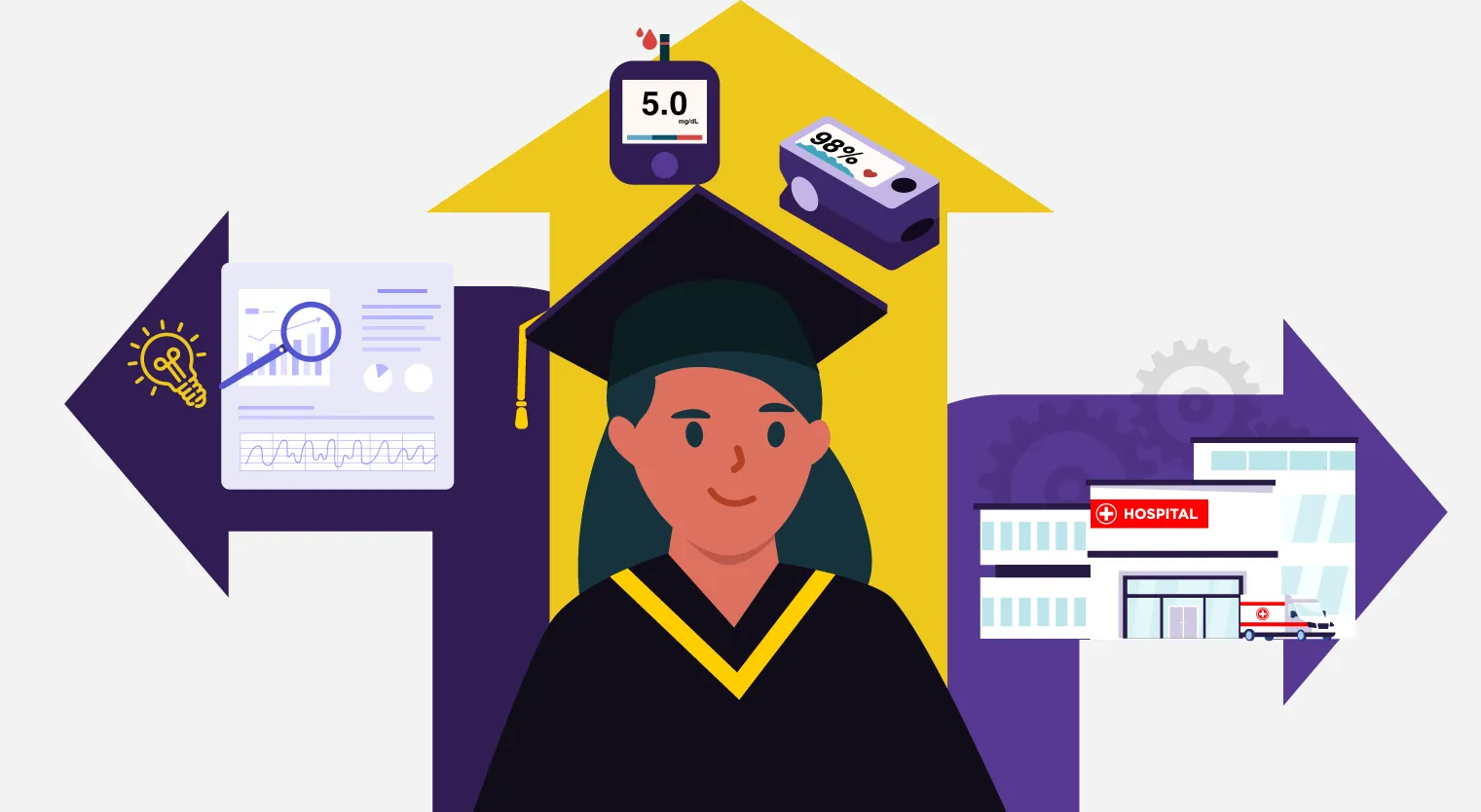
A degree in medical informatics can lead to a wide range of exciting career paths — both in Malaysia and internationally. Depending on your interests, you can choose to work in hospitals, research labs, tech companies, or public health organisations.
If you’re passionate about research, you can work on clinical studies alongside doctors. This may include training AI models for diagnostics, drug discovery, and personalised medicine, conducting clinical trials for wearable technology, or analysing large-scale patient data to improve treatment outcomes or uncover disease patterns.
If you’re interested in healthcare management, this degree can lead you to roles in hospitals and healthcare organisations. As digital medicine becomes the norm, hospitals will increasingly need talent who understand both clinical operations and digital systems — whether it’s to improve electronic health record systems, design more efficient patient care workflows, or lead digital transformation projects.
If you’re into technology and innovation, you could work with medical device companies or join startups that are developing innovative health apps, wearable tech, or remote care platforms. With in-depth training in artificial intelligence and its medical applications, you could even go on to build your own healthtech startup.
No matter the path, one thing is clear — graduates in medical informatics will play a key role in shaping the future of healthcare.
Why study RUMC’s BSc in Medical Informatics?
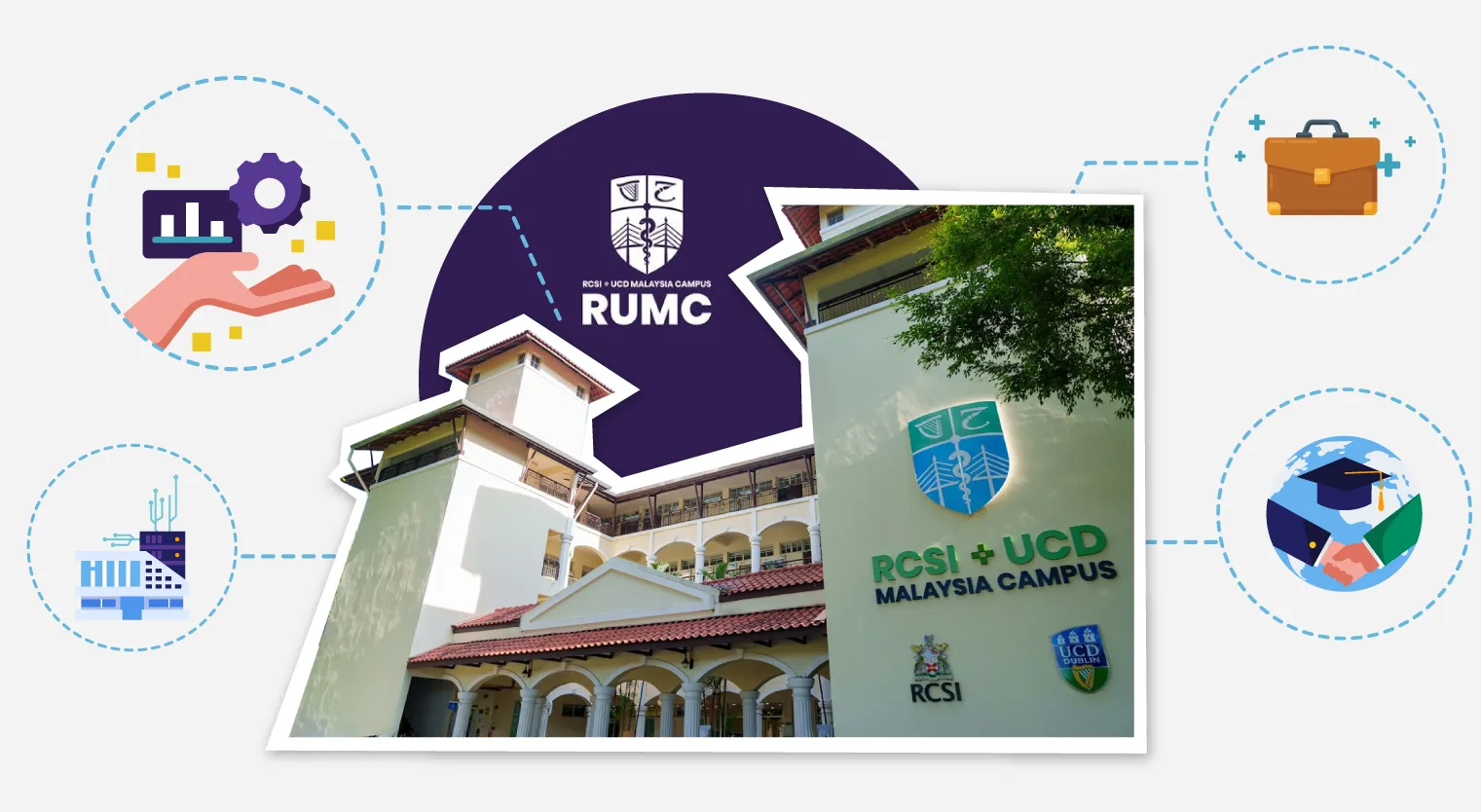
The Bachelor of Science in Medical Informatics at RCSI & UCD Malaysia Campus (RUMC) will equip you with a unique blend of expertise in both healthcare and digital innovation. This interdisciplinary programme prepares you to lead innovation in modern healthcare — combining medical knowledge with skills in data science and artificial intelligence.
Here’s what sets RUMC apart:
- Focus on medical technologies: Learn how to design, develop and optimise technologies for accurate diagnosis and effective treatment.
- Study in Penang, Southeast Asia’s MedTech hub: Penang is home to the highest concentration of MedTech companies in Malaysia, including global names like B. Braun, Abbott, Smith & Nephew, and Boston Scientific.
- Strong industry collaborations: Benefit from RUMC’s strong ties with the medical device manufacturing sector (both in Penang and Dublin) for internships and industry placements.
- Expert Advisory Board: The programme is guided by an Expert Advisory Board from leading institutions (e.g. HIMSS, Thomson Hospital, B. Braun, Dexcom, MHNexus, IIEC), bridging academic excellence with real-world healthcare innovation.
- International connections: As a Malaysian campus of two leading Irish medical institutions (RCSI and UCD), you’ll benefit from a global standard of education, with postgraduate opportunities in Ireland and the United States.
- Guaranteed job placement: RUMC will support you with job placements upon graduation, connecting you directly to opportunities in digital healthcare.
With RUMC’s BSc in Medical Informatics, you will be at the intersection of medicine and technology, helping to shape the future of how healthcare is delivered.
Ready to future-proof your career in healthcare's digital revolution? Leave your details below for more info.

Thank you for your enquiry
Here's what will happen next.
You’ll receive a WhatsApp confirmation from us regarding your enquiry.
Our advisors will be in touch to give you all the information you need.
Did you know all EduAdvisor students can enjoy some of the following waivers / discounts?
- Registration Waivers, Discounts and Rebates: EduAdvisor students often enjoy additional waivers, discounts and rebates during registration due to our close relationship with universities.
- EduAdvisor Registration Reward: Any student that registers through EduAdvisor (or makes an appointment to visit the university through EduAdvisor) is eligible for an extra EduAdvisor Registration Reward of RM300. T&C applies.
Start your application today via our online application form: https://eduadvisor.my/apply

Thank you for your enquiry
Here's what will happen next.
You’ll receive a WhatsApp confirmation from us regarding your enquiry.
Our advisors will be in touch to give you all the information you need.
Did you know all EduAdvisor students can enjoy some of the following waivers / discounts?
- Registration Fee Waiver: A 100% registration fee waiver is available for all EduAdvisor students using this waiver code — AGE24
- EduAdvisor Registration Reward: Any student that registers through EduAdvisor (or makes an appointment to visit the university through EduAdvisor) is eligible for an extra EduAdvisor Registration Reward of RM300. T&C applies.
Head over to: https://www.rumc.edu.my/apply-now/
Remember to use the following waiver code to be eligible for a 100% waiver on the application fee and our EduAdvisor Registration Reward: AGE24

Thank you for your enquiry
Here's what will happen next.
You’ll receive a WhatsApp confirmation from us regarding your enquiry.
Our advisors will be in touch to give you all the information you need.
Did you know all EduAdvisor students can enjoy some of the following waivers / discounts?
- EduAdvisor Registration Reward: Any student that registers through EduAdvisor (or makes an appointment to visit the university through EduAdvisor) is eligible for an extra EduAdvisor Registration Reward of RM300. T&C applies.
Head over to: https://admission.unikl.edu.my/online/frmHome.php
Remember to use the following public agent code to be eligible for our EduAdvisor Registration Reward: PA0001

Thank you for your enquiry
Here's what will happen next.
You’ll receive a WhatsApp confirmation from us regarding your enquiry.
Our advisors will be in touch to give you all the information you need.
Did you know all EduAdvisor students can enjoy some of the following waivers / discounts?
- EduAdvisor Registration Reward: Any student that registers through EduAdvisor (or makes an appointment to visit the university through EduAdvisor) is eligible for an extra EduAdvisor Registration Reward of RM300. T&C applies.
Head over to: https://application.mmu.edu.my/
Select “Agent ID”, fill in the EduAdvisor agent code: AG0000409 and select Distinctive Education Advisor to be eligible for our EduAdvisor Registration Reward.

Thank you for your enquiry
Here's what will happen next.
You’ll receive a WhatsApp confirmation from us regarding your enquiry.
Our advisors will be in touch to give you all the information you need.
Did you know all EduAdvisor students can enjoy some of the following waivers / discounts?
- EduAdvisor Registration Reward: Any student that registers through EduAdvisor (or makes an appointment to visit the university through EduAdvisor) is eligible for an extra EduAdvisor Registration Reward of RM300. T&C applies.
Head over to: https://oculus.uts.edu.my/apply/signup.php
Remember to use the following agent ID to be eligible for our EduAdvisor Registration Reward: DEA

Thank you for your enquiry
Here's what will happen next.
You’ll receive a WhatsApp confirmation from us regarding your enquiry.
Our advisors will be in touch to give you all the information you need.
Did you know all EduAdvisor students can enjoy some of the following waivers / discounts?
- Registration Fee Waiver: A 50% registration fee waiver is available for EduAdvisor students during selected UCSI events.
- EduAdvisor Registration Reward: Any student that registers through EduAdvisor (or makes an appointment to visit the university through EduAdvisor) is eligible for an extra EduAdvisor Registration Reward of RM300. T&C applies.
Head over to UCSI’s website here.
Remember to use the following agent code to be eligible for our EduAdvisor Registration Reward: 779700

Thank you for your enquiry
Here's what will happen next.
You’ll receive a WhatsApp confirmation from us regarding your enquiry.
Our advisors will be in touch to give you all the information you need.
Did you know all EduAdvisor students can enjoy some of the following waivers / discounts?
- Registration Fee Waiver: A 50% registration fee waiver is available for EduAdvisor students during selected UCSI events.
- EduAdvisor Registration Reward: Any student that registers through EduAdvisor (or makes an appointment to visit the university through EduAdvisor) is eligible for an extra EduAdvisor Registration Reward of RM300. T&C applies.
Head over to UCSI’s website here.
Remember to use the following agent code to be eligible for our EduAdvisor Registration Reward: 100023

Thank you for your enquiry
Here's what will happen next.
You’ll receive a WhatsApp confirmation from us regarding your enquiry.
Our advisors will be in touch to give you all the information you need.
Did you know all EduAdvisor students can enjoy some of the following waivers / discounts?
- Tuition Fee Rebate: A RM1,500 tuition fee rebate is available for EduAdvisor students during selected NUMed events.
- EduAdvisor Registration Reward: Any student that registers through EduAdvisor (or makes an appointment to visit the university through EduAdvisor) is eligible for an extra EduAdvisor Registration Reward of RM300. T&C applies.
Head over to: https://application.newcastle.edu.my/registration?ref=1652487az1ydp0i

Thank you for your enquiry
Here's what will happen next.
You’ll receive a WhatsApp confirmation from us regarding your enquiry.
Our advisors will be in touch to give you all the information you need.
Did you know all EduAdvisor students can enjoy some of the following waivers / discounts?
- EduAdvisor Registration Reward: Any student that registers through EduAdvisor (or makes an appointment to visit the university through EduAdvisor) is eligible for an extra EduAdvisor Registration Reward of RM300. T&C applies.
Head over to: https://intake.utmspace.edu.my/refer/63c50d45156c8

Thank you for your enquiry
Here's what will happen next.
You’ll receive a WhatsApp confirmation from us regarding your enquiry.
Our advisors will be in touch to give you all the information you need.
Did you know all EduAdvisor students can enjoy some of the following waivers / discounts?
- Early Bird Waiver: A waiver of RM1,000 is available for all EduAdvisor students enrolling in this programme. T&C applies.
- Edu Assist: A tuition fee waiver of up to 35% is available for students that are from low income family. T&C applies.
- EduAdvisor Registration Reward: Any student that registers through EduAdvisor (or makes an appointment to visit the university through EduAdvisor) is eligible for an extra EduAdvisor Registration Reward of RM300. T&C applies.
Start your application today via our online application form: https://eduadvisor.my/apply

Thank you for your enquiry
Here's what will happen next.
You’ll receive a WhatsApp confirmation from us regarding your enquiry.
Our advisors will be in touch to give you all the information you need.
Did you know all EduAdvisor students can enjoy some of the following waivers / discounts?
- RM500 Rebate: A rebate of RM500 is available for all EduAdvisor students enrolling in this programme.
- EduAdvisor Registration Reward: Any student that registers through EduAdvisor (or makes an appointment to visit the university through EduAdvisor) is eligible for an extra EduAdvisor Registration Reward of RM300. T&C applies.
Start your application today via our online application form: https://eduadvisor.my/apply

Thank you for your enquiry
Here's what will happen next.
You’ll receive a WhatsApp confirmation from us regarding your enquiry.
Our advisors will be in touch to give you all the information you need.
Did you know all EduAdvisor students can enjoy some of the following waivers / discounts?
- Registration Bursary: A further discount of RM1,000 is available for eligible students enrolling in this programme.
Start your application today via our online application form: https://eduadvisor.my/apply

Thank you for your enquiry
Here's what will happen next.
You’ll receive a WhatsApp confirmation from us regarding your enquiry.
Our advisors will be in touch to give you all the information you need.
Did you know all EduAdvisor students can enjoy some of the following waivers / discounts?
- Open Day Waiver: A further waiver of RM450 to RM800 is available for eligible students enrolling in this programme during IMU's Open Day events.
- EduAdvisor Registration Reward: Any student that registers through EduAdvisor (or makes an appointment to visit the university through EduAdvisor) is eligible for an extra EduAdvisor Registration Reward of RM300. T&C applies.
Start your application today via our online application form: https://eduadvisor.my/apply

Thank you for your enquiry
Here's what will happen next.
You’ll receive a WhatsApp confirmation from us regarding your enquiry.
Our advisors will be in touch to give you all the information you need.
Did you know all EduAdvisor students can enjoy some of the following waivers / discounts?
- Application Fee Waiver: A RM100 application fee waiver code is available for EduAdvisor students during selected Monash events.
- EduAdvisor Registration Reward: Any student that registers through EduAdvisor (or makes an appointment to visit the university through EduAdvisor) is eligible for an extra EduAdvisor Registration Reward of RM300. T&C applies.
Start your application today via our online application form: https://eduadvisor.my/apply

Thank you for your enquiry
Here's what will happen next.
You’ll receive a WhatsApp confirmation from us regarding your enquiry.
Our advisors will be in touch to give you all the information you need.
Did you know all EduAdvisor students can enjoy some of the following waivers / discounts?
- EduAdvisor Registration Reward: Any student that registers through EduAdvisor (or makes an appointment to visit the university through EduAdvisor) is eligible for an extra EduAdvisor Registration Reward of RM300. T&C applies.
Start your application today via our online application form: https://eduadvisor.my/apply

Thank you for your enquiry
Here's what will happen next.
You’ll receive a WhatsApp confirmation from us regarding your enquiry.
Our advisors will be in touch to give you all the information you need.
Did you know all EduAdvisor students can enjoy some of the following waivers / discounts?
- Registration Fee Rebate: A registration fee rebate of up to RM1,000 is available for EduAdvisor students enrolling in this programme.
- Early Bird Waiver: An early bird waiver of RM1,500 is available for EduAdvisor students enrolling in this programme for the July 2024 intake.
- EduAdvisor Registration Reward: Any student that registers through EduAdvisor (or makes an appointment to visit the university through EduAdvisor) is eligible for an extra EduAdvisor Registration Reward of RM300. T&C applies.
Start your application today via our online application form: https://eduadvisor.my/apply

Thank you for your enquiry
Here's what will happen next.
You’ll receive a WhatsApp confirmation from us regarding your enquiry.
Our advisors will be in touch to give you all the information you need.
Did you know all EduAdvisor students can enjoy some of the following waivers / discounts?
- Early Bird / Event Day Waiver: A fee waiver of RM500 is available for all EduAdvisor students enrolling in this programme. T&C applies.
- EduAdvisor Registration Reward: Any student that registers through EduAdvisor (or makes an appointment to visit the university through EduAdvisor) is eligible for an extra EduAdvisor Registration Reward of RM300. T&C applies.
Start your application today via our online application form: https://eduadvisor.my/apply

Thank you for your enquiry
Here's what will happen next.
You’ll receive a WhatsApp confirmation from us regarding your enquiry.
Our advisors will be in touch to give you all the information you need.
Did you know all EduAdvisor students can enjoy some of the following waivers / discounts?
- Open Day Waiver: A application fee waiver of up to RM500 is available for all EduAdvisor students enrolling in this programme during MAHSA's Open Days.
- EduAdvisor Registration Reward: Any student that registers through EduAdvisor (or makes an appointment to visit the university through EduAdvisor) is eligible for an extra EduAdvisor Registration Reward of RM300. T&C applies.
Start your application today via our online application form: https://eduadvisor.my/apply

Thank you for your enquiry
Here's what will happen next.
You’ll receive a WhatsApp confirmation from us regarding your enquiry.
Our advisors will be in touch to give you all the information you need.
Did you know all EduAdvisor students can enjoy some of the following waivers / discounts?
- Registration Fee Waiver: A Registration Fee Waiver of up to RM500 is available for EduAdvisor students.
- Special Tuition Fee Waiver: A further discount of RM1,000 is available for eligible EduAdvisor Students enrolling in this programme.
- EduAdvisor Registration Reward: Any student that registers through EduAdvisor (or makes an appointment to visit the university through EduAdvisor) is eligible for an extra EduAdvisor Registration Reward of RM300. T&C applies.
Start your application today via our online application form: https://eduadvisor.my/apply

Thank you for your enquiry
Here's what will happen next.
You’ll receive a WhatsApp confirmation from us regarding your enquiry.
Our advisors will be in touch to give you all the information you need.
Did you know all EduAdvisor students can enjoy some of the following waivers / discounts?
- Registration Fee Discount: A rebate of RM500 to RM1,000 is available for EduAdvisor students enrolling in this programme.
- EduAdvisor Registration Reward: Any student that registers through EduAdvisor (or makes an appointment to visit the university through EduAdvisor) is eligible for an extra EduAdvisor Registration Reward of RM300. T&C applies.
Start your application today via our online application form: https://eduadvisor.my/apply

Thank you for your enquiry
Here's what will happen next.
You’ll receive a WhatsApp confirmation from us regarding your enquiry.
Our advisors will be in touch to give you all the information you need.
Did you know all EduAdvisor students can enjoy some of the following waivers / discounts?
- Event Waiver: A RM500 admin fee rebate is available for all EduAdvisor students during selected UM-Wales events. T&C applies.
- EduAdvisor Registration Reward: Any student that registers through EduAdvisor (or makes an appointment to visit the university through EduAdvisor) is eligible for an extra EduAdvisor Registration Reward of RM300. T&C applies.
Start your application today via our online application form: https://eduadvisor.my/apply

Thank you for your enquiry
Here's what will happen next.
You’ll receive a WhatsApp confirmation from us regarding your enquiry.
Our advisors will be in touch to give you all the information you need.
Did you know all EduAdvisor students can enjoy some of the following waivers / discounts?
- Registration Waiver: A rebate of RM1,000 to RM2,000 is available for EduAdvisor students enrolling in this programme.
- EduAdvisor Registration Reward: Any student that registers through EduAdvisor (or makes an appointment to visit the university through EduAdvisor) is eligible for an extra EduAdvisor Registration Reward of RM300. T&C applies.
Start your application today via our online application form: https://eduadvisor.my/apply

Thank you for your enquiry
Here's what will happen next.
You’ll receive a WhatsApp confirmation from us regarding your enquiry.
Our advisors will be in touch to give you all the information you need.
Did you know all EduAdvisor students can enjoy some of the following waivers / discounts?
- Application Fee Waiver: A fee waiver of RM150 is available for all EduAdvisor students enrolling in this programme. T&C applies.
- EduAdvisor Registration Reward: Any student that registers through EduAdvisor (or makes an appointment to visit the university through EduAdvisor) is eligible for an extra EduAdvisor Registration Reward of RM300. T&C applies.
Start your application today via our online application form: https://eduadvisor.my/apply

Thank you for your enquiry
Here's what will happen next.
You’ll receive a WhatsApp confirmation from us regarding your enquiry.
Our advisors will be in touch to give you all the information you need.
Did you know all EduAdvisor students can enjoy some of the following waivers / discounts?
- Open Day Rebate: A RM500 rebate is available for EduAdvisor students during MCKL's events.
- EduAdvisor Registration Reward: Any student that registers through EduAdvisor (or makes an appointment to visit the university through EduAdvisor) is eligible for an extra EduAdvisor Registration Reward of RM300. T&C applies.
Start your application today via our online application form: https://eduadvisor.my/apply
Thank you for your enquiry
Here's what will happen next.
You’ll receive a WhatsApp confirmation from us regarding your enquiry.
Our advisors will be in touch to give you all the information you need.
Did you know all EduAdvisor students can enjoy some of the following waivers / discounts?
- Open Day Waiver: A application fee waiver of up to RM500 is available for all EduAdvisor students enrolling in this programme during MAHSA's Open Days.
- EduAdvisor Registration Reward: Any student that registers through EduAdvisor (or makes an appointment to visit the university through EduAdvisor) is eligible for an extra EduAdvisor Registration Reward of RM300. T&C applies.
Head over to: https://at.edv.my/apply-mahsa
Thank you for your enquiry
Here's what will happen next.
You’ll receive a WhatsApp confirmation from us regarding your enquiry.
Our advisors will be in touch to give you all the information you need.
Did you know all EduAdvisor students can enjoy some of the following waivers / discounts?
- Registration Waivers, Discounts and Rebates: EduAdvisor students often enjoy additional waivers, discounts and rebates during registration due to our close relationship with universities.
- EduAdvisor Registration Reward: Any student that registers through EduAdvisor (or makes an appointment to visit the university through EduAdvisor) is eligible for an extra EduAdvisor Registration Reward of RM300. T&C applies.
Start your application today via our online application form: https://eduadvisor.my/apply

Generating your application
Hang tight! This will only take 1-2 minutes...
0%

Your application form is ready
We've prepared your university application based on the details provided. Review and sign to complete your university application.

Submitting your application
Hang tight! This will only take 1-2 minutes...
0%

Your application form is submitted

Loh Sue May
Editor and writer. When I'm not busy putting words onto pages, I'm messing with spreadsheets and playing air guitar.
